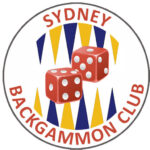By kind permission of the UKBGF (WBGF’s rules are here.)
Earlier this year the World Backgammon Federation (WBGF) published a revised set of rules, which has already seen use at the World Team Championships and other WBGF-sanctioned events and adoption by a number of other federations. The SBC Board has decided to adopt them with effect from our first tournament on 3rd February 2024. They will be available on the SBC’s website prior to then and a hard copy at every event.
The WBGF has composed a set of rules which will, hopefully, be accepted world-wide. This has been a significant effort to bring together a lot of disparate practices, and the value of having a single set of rules applicable everywhere is a significant step forward.
How did we get here?
The original UKBGF rule set was originally drafted by Raj Jansari and Peter Bennet. This was then distributed around both the UK backgammon community and wider afield (incl. SBC), and comments were invited.
Raj was then invited to join the EUBGF rules and ethics panel, and adapted the UKBGF rules to fit the EUBGF, and all member federations adopted them. The EUBGF then expanded to become the WBGF, and it became a goal to have a single unified rule set, at least in part in order to be taken more seriously by global bodies such as the IOC. The USBGF and the tournament circuit represented by Arda Findikoglu could not accept the rules as they stood, leading to a significant disparity in practice. Over successive years detailed negotiations have been taking place to create a rule set that all could agree on. This was largely achieved by allowing options in two key areas so that tournament directors could have the freedom to select options that reflect local practice while remaining within the scope of the unified rule set. The intent is not for nations to pick and choose rules; rather it’s for local organisers to select what is appropriate for them. WBGF encourages TDs and club organisers to experiment and feed back their experiences.
New options
There are two significant new options available to TDs:
· Legal Moves / Responsible Moves. In Legal moves both players have an obligation to point out illegal moves before the next turn. In Responsible moves the player making a move has the obligation to correct any mistake that he may make, but the opponent is not obliged to point out a mistake. (SBC has decided to follow the Responsible Moves option but are open to discussing the other possibility.)
· Dice Not On Checkers / Dice On Checkers: In Dice On Checkers, a roll where either or both dice come to rest flat on the top surface of a checker is valid. In Dice Not On Checkers, the current UK practice, either die landing on a checker results in a cocked roll. (SBC has decided to follow the Dice Not On Checkers option)
While the WBGF don’t intend to impose either option, to avoid any doubt if it is not explicitly stated which option is being used in either case, then it will be assumed to be that which maintains the status quo: Legal Moves and Dice Not On Checkers.
Other significant changes
While most of the other changes are catching up with current practice, for example recording and streaming matches (which was rather less common in our rule set to date!), and clarifying the rules further, there are a few new points to note:
· Gesturing towards the cube: What constitutes a double? It used to be the case that gesturing towards the cube was assumed to indicate an intent to double, but that rule was somewhat vague (and on one occasion I’ve had an unrelated hand-wave interpreted as a double when it certainly wasn’t intended to be!). This has been clarified so that only unambiguous actions such as saying “double”, picking up the cube, or pointing at the cube, are deemed to commit you to doubling.
· Premature rolls: It is currently the case that if a player rolls prematurely, his roll is deemed to stand and his opponent is able to complete the current move with the knowledge of the next roll. This has now been changed so that the opponent can choose between either making a move knowing the next roll, or asking for the dice to be picked up and rolled at the appropriate time, provided that that choice is made consistently. So, you can ask for a re-roll each time, but you can’t effectively condone premature rolls up to the point where the premature roll is a joker, and only then ask for a re-roll. Using a single pair of dice even when not using a clock is helpful in reducing the incidence of premature rolls. (SBC has decided that all premature rolls shall be deemed illegal. It makes a TD’s life a lot easier!)
· Checker-shuffling: The new rules forbid uncontrollable checker-shuffling – that is, any movement of checkers to try out positions (regardless of how long it goes on for, or the mechanics of how it is done) which is done in a manner likely to lead to the original position being lost. Players are advised to leave moved checkers clearly offset from the rest on the points where they are being moved to, so that it is clear what the move being considered is and how it should be reverted.
· Incorrect starting position: This may now be corrected after consulting the TD.
So is this the end of the story?
Not at all – the SBC is keen to hear feedback from players, especially those who may not have experienced some of these options before.
I’d like to acknowledge the work done by Raj, Peter and the UKBGF over the years and Julia Hayward’s original piece that appeared on the UKBGF’s website that I’ve used as the basis for this SBC piece.

